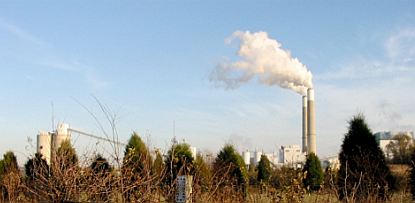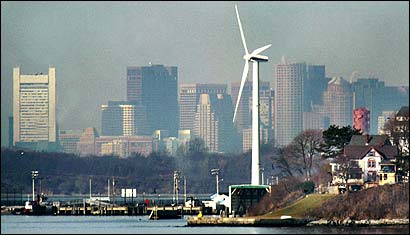I was in a Red Sox bar, Fat Face Fenners's Fishack, in Los Angeles recently and asked about a beer on tap I'd never seen before, Fat Tire. I asked our waitress, "I've never seen that beer with the bicycle on the tap before, what's that like?"
"Umm, that's Fat Tire," she said. 
Right name, lousy description. "Yes, what's it like?" I asked.
"Umm, it's brewed in Colorado," she continued, skillfully avoiding anything that might give away what the beer actually tasted like. "It's good."
With the possibility remaining open that Fat Tire could taste like anything from sewer rat to pumpkin pie, I just ordered whatever light beer was on draft. But days later, I caught a mention of the beer in Outside Magazine's green issue. Turns out the brewery that makes Fat Tire Amber Ale, New Belgium Brewing, might be the greenest brewery in the country.
While New Belgium only brews one organic beer, Mothership Wit, it uses sustainable practices from the start of its brewing process (using far less water than most breweries) to the finish (using bottles made out of recycled glass and shipping on biodiesel trucks). Greenhouse Gas Emissions Reduction: In 1998, New Belgium took an employee vote and became the country's first brewery to subscribe to wind energy. ... Employee owners voted to dip into their bonus pool to help finance the conversion.
Healthy Watersheds: Through recapture and reuse, New Belgium uses less than four barrels of water to produce one barrel of beer, significantly less than the industry average.
Green Building: In 2002 we agreed to participate in the United States Green Building Council’s Leadership in Energy and Environmental Design for Existing Buildings (LEED-EB) pilot program. From sun tubes and daylighting throughout the facility to reusing heat in the brewhouse, we continue to search out new ways to close loops and conserve resources.
Reduce, Reuse, Recycle: The three "R's" of being an environmental steward. Our reuse program includes heat for the brewing process, cleaning chemicals, water and much more. Recycling at New Belgium takes on many forms, from turning "waste" products into something new and useful (like spent grain to cattle feed), to supporting the recycling market in creative ways (like turning our keg caps into table surfaces). We also buy recycled whenever we can, from paper to office furniture. Reduction surrounds us, from motion sensors on the lights throughout the building to induction fans that pull in cool winter air to chill our beers. Offsetting our energy needs is the cornerstone to being environmentally efficient.
Living Sustainably: Having our own Sustainability Specialist, Nic Thiesen, has given us access to all sorts of great information. If you want to learn more about any of the programs to which New Belgium subscribes or maybe you’d like to have wind power at your home, check out these links. Not that I don't love Wolaver's organic beer, but all that seems to blow Wolaver's sustainability page out of the water, doesn't it?
Unfortunately, New Belgium isn't sold east of the Mississippi. It's not even available at DC's vaunted Brickskeller, home to 300 or so beers. But if you're traveling out west (or God forbid someone out west has stumbled upon this blog) give it a try!



















